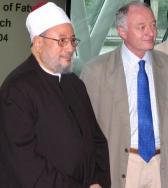 There’s a report published today at Pink News entitled “Ken Livingstone promises new gay rights measures if elected London mayor”. Having given a sympathetic account of Ken’s newly announced policies in support of the LGBT community, the article ends:
There’s a report published today at Pink News entitled “Ken Livingstone promises new gay rights measures if elected London mayor”. Having given a sympathetic account of Ken’s newly announced policies in support of the LGBT community, the article ends:
“He has a good gay rights record, implementing the first civil partnerships register for gay couples in London in 2001. However, he was criticised in 2005 for inviting to London and embracing the homophobic Islamist cleric Dr Yusuf al-Qaradawi, who has called for gays and lesbians to be killed.”
Leaving aside the fact that Ken didn’t invite Qaradawi to London, and that the visit took place in 2004, let us state one more time: Qaradawi does not call for “gays and lesbians to be killed”.
The source for this accusation is a passage in his book The Lawful and the Prohibited in Islam, which was written in the late 1950s when Qaradawi was a young, orthodox, Al-Azhar trained scholar who had not yet developed his own distinctive interpretations of Islam, and in that book he restricted himself to providing a summary of traditional rulings by Islamic jurists on a range of issues.
The offending passage on homosexuality reads as follows: “The jurists of Islam have held differing opinions concerning the punishment for this abominable practice. Should it be the same as the punishment for fornication, or should both the active and passive participants be put to death? While such punishments may seem cruel, they have been suggested to maintain the purity of the Islamic society and to keep it clean of perverted elements.”
On the face of it, this does sound horrendous. If Qaradawi was not himself calling for homosexuals to be executed, he was apparently unwilling to criticise Islamic scholars who did. But this is to misunderstand the nature of the punishments that Qaradawi was referring to.
Under the various schools of sharia law homosexuality is treated as a sub-section of adultery. The Islamic jurists who formulated the legal position on this issue in the years following the Prophet’s death were trying to put a stop to the barbaric practices associated with a backward tribal society which did lead to individuals (mainly women) being killed in order to defend the “honour” of the family or community.
These early jurists ruled that it wasn’t adultery, and by extension homosexuality, that was a crime but rather the sexual act itself, and further that four independent witnesses to the sexual act were required for a conviction. The result was to preserve the draconian punishments – stoning etc – as a symbol of extreme social disapproval while raising the evidential requirements so high that in practice it was impossible to sentence anyone to those punishments.
So when Qaradawi was discussing the penalties for gay sex in The Lawful and the Prohibited in Islam it was these symbolic punishments he was referring to.
In a 2006 interview on Al Jazeera, when asked about the Islamic position on homosexuality, Qaradawi again summarised the views of the early Islamic jurists:
“The schools of thought differed over the punishment. Some of them would punish as they would the fornicator/adulterer, so distinguishing between married and unmarried men, and between married and unmarried women. And some of them said the punishment of the two is equal. And some of them said we throw them from a high place, like our Lord did to the People of Lot. And some of them said we burn them.”
But Qaradawi continued: “There is disagreement, so it is possible for us to choose from them in our era what is most appropriate, and what is lightest, recognising how widespread the tribulation is: because tribulations and sins being widespread is something in Islamic legal theory that causes things to be lightened.”
So it would appear that Qaradawi’s view now is that in the modern world the draconian punishments are no longer applicable, even symbolically, to the “crime” of gay sex.
Continue reading →
 “A Mail on Sunday investigation – which will alarm anyone concerned about animal cruelty – has revealed that schools, hospitals, pubs and famous sporting venues such as Ascot and Twickenham are controversially serving up meat slaughtered in accordance with strict Islamic law to unwitting members of the public….
“A Mail on Sunday investigation – which will alarm anyone concerned about animal cruelty – has revealed that schools, hospitals, pubs and famous sporting venues such as Ascot and Twickenham are controversially serving up meat slaughtered in accordance with strict Islamic law to unwitting members of the public….
 It has now been widely
It has now been widely 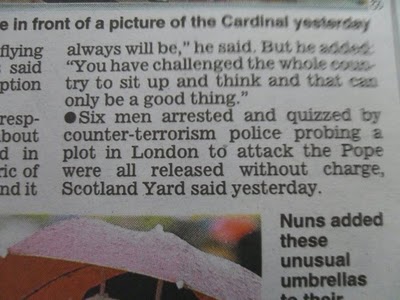
 There’s a report published today at
There’s a report published today at 
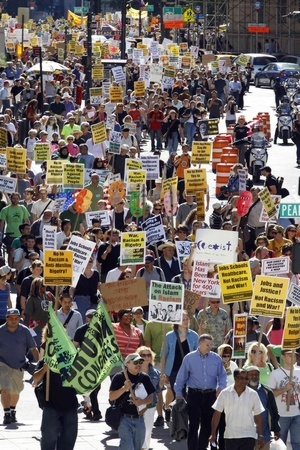
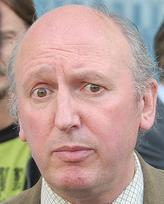 Anders Gravers of Stop Islamisation of Europe
Anders Gravers of Stop Islamisation of Europe 

 You might have thought that a feminist journalist would welcome the elevation of Caroline Lucas to the leadership of the Green Party and her election as the party’s first MP. But not Julie Bindel. In a piece of monumental ignorance published in
You might have thought that a feminist journalist would welcome the elevation of Caroline Lucas to the leadership of the Green Party and her election as the party’s first MP. But not Julie Bindel. In a piece of monumental ignorance published in 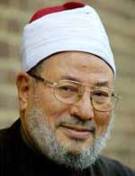 The International Union of Islamic Scholars has urged Muslims to react peacefully to the planned burning of copies of the Holy Quran by a small church in the US on the ninth anniversary of the September 11, 2001 attacks on Saturday.
The International Union of Islamic Scholars has urged Muslims to react peacefully to the planned burning of copies of the Holy Quran by a small church in the US on the ninth anniversary of the September 11, 2001 attacks on Saturday. “… this rally, on this very tragic day for Americans, but most tragic for those who lost their families, to use it and abuse it as a platform for bigotry, is not only tragic, it’s un-American”.
“… this rally, on this very tragic day for Americans, but most tragic for those who lost their families, to use it and abuse it as a platform for bigotry, is not only tragic, it’s un-American”.